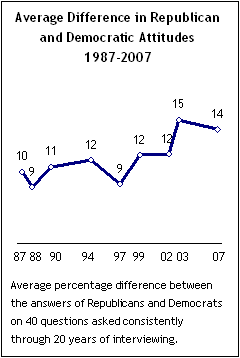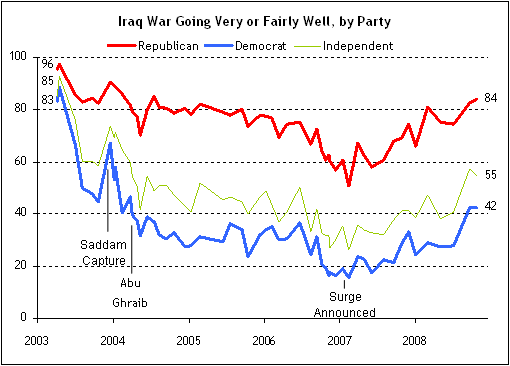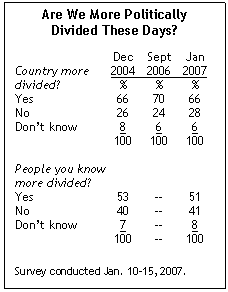In the 2000 presidential campaign, George W. Bush famously pledged that if elected he would be a “uniter, not a divider.” He cited his record as governor of Texas and vowed he would work with Democrats in Washington to get the people’s business done. But the nation was about to enter a period of great upheaval – first came the partisan battles over the election results, then a slowing economy and a wave of business scandals. But the devastating terror attacks of Sept. 11, 2001, the wars that followed and the tradeoffs made to protect the country from future attack had the greatest impact on the persistent partisan divide.
The initial response to the horrific attacks had been national unity, exemplified by the near-universal support for taking on Al Qaeda in Afghanistan. But that spirit soon dissolved amid rising political polarization and anger, largely over the strategy and rationale for launching a pre-emptive war to oust Saddam Hussein in Iraq. Following Sept. 11, members of both parties, but especially Republicans, grew more supportive of an assertive national security policy – as seen in attitudes on the use of force and other issues. But in the following years, many Democrats shifted away from that approach, frustrated by the war in Iraq and worried about whether it would actually help eliminate terror groups like Al Qaeda.
 More than a year before the 2004 election, Pew’s longitudinal study of the public’s political values showed that partisan polarization had reached a new high, as both Republicans and Democrats had become more intense in their political beliefs. The 2007 wave of the same study found that this increase in the size of the partisan gap persisted into Bush’s second term.
More than a year before the 2004 election, Pew’s longitudinal study of the public’s political values showed that partisan polarization had reached a new high, as both Republicans and Democrats had become more intense in their political beliefs. The 2007 wave of the same study found that this increase in the size of the partisan gap persisted into Bush’s second term.
The Iraq war started in March 2003 and Baghdad quickly fell to U.S. forces. But the war proved far from over, as the American military and its allies faced a long and deadly struggle to establish peace and order. U.S. forces found no weapons of mass destruction,
though administration officials had argued their presence was the primary reason for the push to war.
That July, perceptions of the situation proved highly partisan. Nearly twice as many Republicans as Democrats said the military effort was going well (34% vs. 18%). Roughly nine-in-ten Republicans (88%) at that time backed the decision to go to war, compared with fewer than half (48%) of Democrats.
The Bush Gap
A May 2004 poll showed the great level of partisanship in evaluations of the president’s performance. As had been the case since Bush took office, Republicans were solidly behind him, with 85% approving and just 11% disapproving of his job performance. But, for the first time, Democrats were nearly as unified in opposition to Bush. Just 13% of Democrats approved of the president’s job performance, while 79% disapproved.
As the election approached, Bush was in a tight contest against Massachusetts Sen. John Kerry. Despite the deep partisan divisions, enough swing voters apparently had doubts about changing leaders at wartime or putting Kerry in charge of the fight against terrorism. Bush won a second term with 51% of the vote and Republicans held on to their congressional majorities.
Pew’s post-election survey showed that the divisions so apparent in the election showed no signs of narrowing. The public remained deeply split over the president’s job performance, the situation in Iraq and the state of the national economy. Bush voters were upbeat on all three questions – 92% approved of the president’s job performance; 79% said the war effort was going well, and 58% said the economy was excellent or good. Those who voted for Kerry, meanwhile, offered dramatically different answers. Only 7% approved of the president’s job performance; 75% said the war was not going well and 81% described the economy as only fair or poor.
Divided Over the War …
The war would continue to be a major reason for the divide between Republicans and Democrats. In December 2005, Republicans were more than twice as likely as Democrats to believe that the U.S. military effort in Iraq was going at least “fairly well” (78% for Republicans, 32% for Democrats). Independents (47%) were closer to Democrats in their assessment. Similar gaps showed up in more specific questions: 74% of Republicans said progress was being made on stopping the use of Iraq as a terrorist base for attacks; only 31% of Democrats agreed.
The wide partisan gap in views of the situation in Iraq continued even after the U.S. troop surge reduced the level of violence in the country. In 2008, increasing proportions of Republicans, Democrats and independents expressed positive opinions about the military situation in Iraq. But the partisan differences in perceptions remained sizable and the public remained deeply split over whether to bring U.S. forces home from Iraq as soon as possible, or keep them there until the situation stabilizes.

And the Economy
In a stark contrast to the Clinton years, public perceptions of the economy were also deeply split along political lines for much of Bush’s presidency. In January 2006, about a third of Americans (34%) rated  economic conditions as excellent or good, while nearly twice that number said they were fair or poor (64%). Republicans generally saw an economy that was thriving; 56% judged it as excellent or good. Democrats and independents, meanwhile, were more negative; just 23% of Democrats and 28% of independents said the economy was doing well.
economic conditions as excellent or good, while nearly twice that number said they were fair or poor (64%). Republicans generally saw an economy that was thriving; 56% judged it as excellent or good. Democrats and independents, meanwhile, were more negative; just 23% of Democrats and 28% of independents said the economy was doing well.
Republicans have long had significantly higher incomes than independents of Democrats. But across every income category, Republicans were substantially more likely than Democrats to view the economy positively.
It was only after the nation’s economy deteriorated in Bush’s final year in office, and Republicans’ opinions of the economy turned much more negative, that the partisan divide narrowed. By December 2008, just 11% of Republicans viewed the economy as excellent or good, compared with 8% of independents and 4% of Democrats.
Darkening Clouds for the GOP
In the 2006 midterm elections, growing negative perceptions of Bush and the GOP-controlled Congress turned into trouble for the Republicans. Democrats took control of both the House and the Senate. Democrats held a small turnout advantage (38% to 36%, according to the National Exit polls), but what determined the outcome was the shifting sentiments of independents and moderates.
These voters showed a strong preference for Democratic candidates. For example, by 57%-39%, independent voters cast ballots for Democrats, according to exit polls. Two years earlier, independent voters were more evenly divided (50% Democrat-46% Republican).
Exit polls showed that Bush was more of a drag on GOP candidates than former President Clinton was on Democratic candidates in 1994, when Republicans were able to take control of Congress. More than a third (36%) said they voted to oppose Bush; that compares with 27% who voted to oppose Clinton in 1994, and 21% in 1998, the year Congress voted to impeach the president.
Views of Congress also were extremely negative. About four-in-ten voters (41%) said that Congress had accomplished less than usual, while just 6% said it had accomplished more than usual. By a 62%-to-10% margin, voters said that Republicans, not Democrats, were to blame. High-profile scandals also had an impact. But the war remained the central issue. By Election Day, 42% of the public approved of the war, compared with 56% who disapproved.
 As the Democratic Congress convened in January 2007, a Pew survey showed that a large majority (66%) continued to say that the country was more politically divided than it had been in the past. The perception that America had become more polarized was shared across partisan and ideological groups, although Democrats (72%) were especially likely to say the country had become more divided.
As the Democratic Congress convened in January 2007, a Pew survey showed that a large majority (66%) continued to say that the country was more politically divided than it had been in the past. The perception that America had become more polarized was shared across partisan and ideological groups, although Democrats (72%) were especially likely to say the country had become more divided.
At that time, Americans overwhelmingly thought there were important differences between the Democratic and Republican parties. More than a third (35%) said there was a great deal of difference between the two major parties, while another 40% said they saw a fair amount of difference. Only 20% said there was hardly any difference between the parties.


